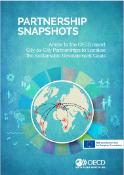Centre for Entrepreneurship, SMEs, Regions and Cities

City-to-City Partnerships to Localise the Sustainable Development Goals
City-to-city partnerships and decentralised development co-operation (DDC) can play
a key role in advancing the SDGs and in addressing global megatrends, the aftermath
of the COVID-19 pandemic and other shocks. This report discusses the framework conditions
for effective city-to-city partnerships and takes stock of existing monitoring and
evaluation mechanisms. As a complement, it proposes a systemic monitoring and evaluation
framework for city-to-city partnerships to localise the SDGs, combining self-assessment
and SDG indicators. This framework aims to bridge the gap in terms of measuring the
progress of cities engaged in partnerships on the 2030 Agenda and their compliance
with the G20 Rome High-Level Principles on city-to-city partnerships for localising
the SDGs. The report also presents lessons learned from a pilot-testing of this new
framework and highlights policy implications and ways forward to enhance the sustainability,
transparency and accountability of city-to-city partnerships, in a shared responsibility
across levels of government and stakeholders.
Available from April 20, 2023
In series:OECD Urban Studiesview more titles
TABLE OF CONTENTS
| Preface | |
| Foreword | |
| Abbreviations and acronyms | |
| Executive summary | |
| City-to-city partnerships: The road to sustainability | |
| Rationale and frameworks for assessing city-to-city partnerships | |
| A systemic monitoring and evaluation framework for city-to-city partnerships to localise the SDGs | |
| Testing the self-assessment framework in pilot city-to-city partnerships | |
| Policy implications for city-to-city partnerships and ways forward | |
Powered by OECD iLibrary
